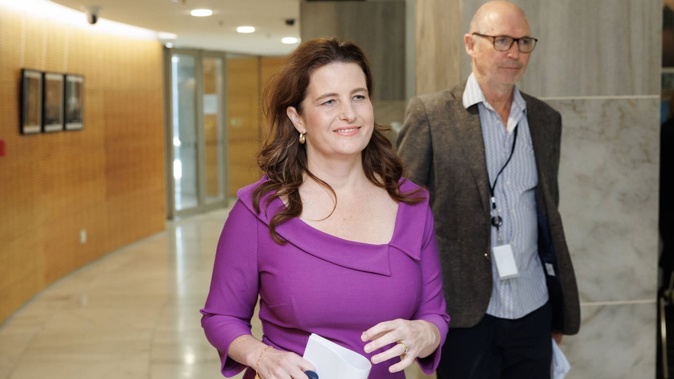
- Finance Minister Nicola Willis will deliver a major pre-Budget speech to the Hutt Valley Chamber of Commerce.
- Willis confirmed no tax changes for charities in the upcoming Budget, citing complexity and minimal revenue.
- The Budget will include just $1.3 billion in new operating spending.
Finance Minister Nicola Willis said the Government plans to cut “billions” of dollars worth of programmes started under the previous governments, freeing up cash for what she is billing as one of the tightest Budgets in a decade.
The announcement was made in a pre-Budget speech to the Hutt Valley Chamber of Commerce.
The speech will be livestreamed from 7.30am below.
“The Government’s savings drive has freed-up billions of dollars,” Willis said.
“Those savings will now be re-deployed to fund New Zealand’s most pressing priorities,” she said.
Alongside the cuts, Willis announced there would be just $1.3 billion worth of new discretionary operating spending (an operating allowance) in this year’s Budget — this is the smallest allowance in nominal terms since 2015.
The $1.3b figure itself represents a substantial cut to what was planned.
Last year, Willis said the Budget would include $2.4b of new operating spending. Last year, Treasury said $2.5b in new spending would be needed just to fund the increased cost of delivering services.
By opting for such a small allowance, Willis and the Government will need to cut billions of dollars worth of spending across the government in order to fund the growing cost of existing services.
Just how the Government plans to do this is a mystery — in December Treasury said there was about $700m worth of new spending left in the Budget, after Willis pre-allocated funds for health and raided the 2025 Budget to pay for the funding of new medicines for Pharmac.
Willis said the Government had “undertaken a significant savings drive” to free up money for this Budget.
“That effort has involved Ministers identifying areas of previously committed spending that can no longer be justified in light of the challenging circumstances New Zealand now faces.
“We’ve analysed spending decisions made by previous governments and re-evaluated them in the context of today’s constraints.
“This has involved a line-by-line review of previous funding commitments, including money put aside in contingency,” she said.
Willis said the tighter allowance will mean the Government will spend “billions less over the forecast period than would have otherwise been the case”.
“This will reduce the amount of extra borrowing our country needs to do over the next few years and it will keep us on track towards balanced books and debt reduction,” she said.
“No lolly scramble”
Willis said that these tight spending requirements would mean no “lolly scramble” of new goodies in the Budget.
In practice, however, it might be even tighter than that.
Most Government departments have no increase to their baseline funding, what is known as a “zero budget”. If they need more funding to keep the lights on, that funding is paid for by cutting spending elsewhere.
Willis said the Government will still invest in “health, education, law and order, the defence force, business growth and targeted cost of living relief”, however these investments would in large part be paid for by reprioritisations.
Growth will be lower — cuts will keep surplus in sight
Willis said Treasury’s latest forecasts showed the economy was still on track to grow in the coming year, but worsening economic conditions since US President Donald Trump’s “Liberation Day” tariffs had weighed down the forecasts, “reducing their assumptions of real GDP growth in New Zealand in 2025 and 2026”.
She said this lower growth required threatened to throw its fiscal strategy off track, kicking out the return to surplus.
In December, Treasury forecast a return to surplus under the new OBEGALx measure by 2029 — and Willis’ fiscal strategy is to target a surplus one year earlier.
She said the small amount of new spending in this Budget means that Treasury’s latest numbers — which are not the final numbers for the Budget — still forecast a surplus in 2019.
“The reality of global economic events is that if we’d pushed on with a larger operating allowance then we would be staring down the barrel of even bigger deficits and debt,” Willis said.
No Charities tax
Willis revealed on Newstalk ZB’s Heather du Plessis-Allan Drive on Monday she would not be making tax changes to tax charities in the Budget.
The Government had openly been investigating changing the way charities are taxed so businesses that operate as charities are treated like businesses and pay company tax.
“I can confirm that [no changes are coming at the Budget] because we are continuing work in this area.
“We had a short, sharp consultation with the charities sector and that has thrown up two key things: that is the potential revenue the Government would get from this is pretty small ... at the most, $50 million a year, so it’s not essential to our Budget that we hurry these changes through.
“What officials have advised is the consultation has uncovered a lot of complexity about definitions and rules and how charities would react in practice,” Willis said .
This could mean changes are coming in future, but not at the current Budget.
“I want to work through it carefully, I’m very committed to making sure we’ve got a fair system with high integrity. We will be making changes in this space but I don’t want to rush it and get it wrong,” she said.
Thomas Coughlan is the NZ Herald political editor and covers politics from Parliament. He has worked for the Herald since 2021 and has worked in the Press Gallery since 2018.
Take your Radio, Podcasts and Music with you









